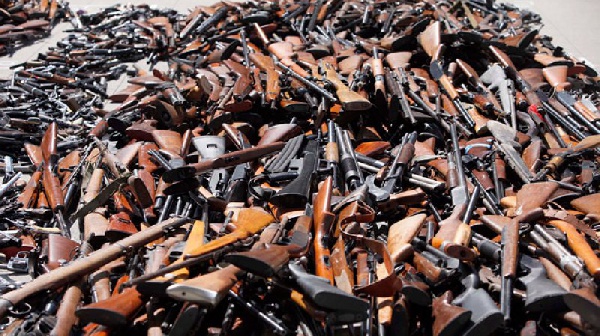The National Commission on Small Arms and Light Weapons (NCSALW) says there are approximately 30 arms importers licensed in Ghana, with mostly no credible database on their activities.
State institutions do not have exact statistics on the number of arms these licensed arms dealers import annually, or who they sell these weapons to because current State legislations lack the capacity to ensure the effective monitoring of their activities.
There are varied statistics on the number of arms (mostly small arms i.e. assault rifles, pistols, double barrel guns, pump action guns) that are periodically imported into the country. Some security analysts put the figure at 6,000 guns annually. Some peg the figure even higher.
“Arms are serious issues, and countries should have effective tracking and monitoring systems in a foolproof database,” Dr. Cyriaque Agnekethom, Head of the ECOWAS Small Arms Unit, stated.
Speaking to journalists at a small arms workshop held in Sogakope (Volta Region) over the weekend, Jones B. Applerh, Executive Secretary of NCSALW, said six of these arms dealers were active, adding, “Weapons are big money deals”.
For various security considerations, the names of these active brokers have been kept under wraps.
There are some people who have openly stated their status as arms dealers. For instance, Kofi Wayo, a maverick businessman and a member of the Energy Commission has noted on several platforms that he dealt in arms. Sources from the NCSALW told DAILY GUIDE that it was unclear whether Mr. Wayo was an active or a dormant arms broker.
Mr. Applerh stated that for the past three years, government had not allowed the importation of weapons into the country. “Gen. Nunno Mensah is really strict on that,” Jones Applerh noted. However, this does not stop a possible clandestine trade in the arms business.
Joseph Nunoo-Mensah is the National Security Advisor to President Mills.
Mr. Applerh fears these active arms dealers could be doing all sorts of things to maximize their returns on investment. Indeed, when arms dealers try to increase their bottom- lines it means proliferation of more arms.
Instructively, there are 24 other arms dealers who possess licenses to import arms but do not have the financial capacity to import any sizeable amount of weapons.
Referring to the two categories of arms dealers in Ghana, Mr. Applerh told DAILY GUIDE that “some have the license but do not have the money, however some have both the money and the license”.
Critics warn that activities of the 24 dealers may be more sinister than meets the eye. Even though they are perceived not to have the financial wherewithal, they could still import little quantities of arms because of their license. If they do import, the systems may be incapable of adequately capturing them in a database.
The police are restricted by law from adequately putting the tabs on these arms trade. “The police don’t even think Ghana has a gun problem, rather they are convinced that Ghana rather has armed robbery problem, drug problems,” Mr. Applerh noted, adding that these crimes were all symptoms of the gun influence in the country.
A 2004 baseline statistics of the Commission on Small Arms indicated that there were about 300,000 guns currently in Ghana and majority (about 220,000) of these guns were held by civilians who might not be adequately captured in the database of the Ministry of Interior and other security agencies.
“Many of these guns are illegally held anyway”, said the NCSALW boss.
Guns have become a critical issue in Ghana in recent times. The sporadic reports of gunshots and gun possession have made it even more important for legislations to be tightened on arms possession.
Dr. Agnekethom noted that even though Ghana’s legislations prescribed stringent processes of civilian acquisition of guns, there were no clear provisions on how these guns should be held. For instance, in the name of self defence, eligible people are licensed to own guns; these people can walk about with guns and may not be subject to serious sanctions because the laws on gun control do not explicitly spell out how or where people can hold their legally acquired guns.
There are several statutes that seek to regulate arms in Ghana, for instance the Arms and Ammunition Act (1962) amended in 1996 and 2001, which sets out guidelines for the import, export and manufacture of small arms and civilian ownership of arms in the country. But all these laws are not clear enough, says experts.
General News of Wednesday, 25 April 2012
Source: Daily Guide
No Data on 30 Arms Dealers

Entertainment











